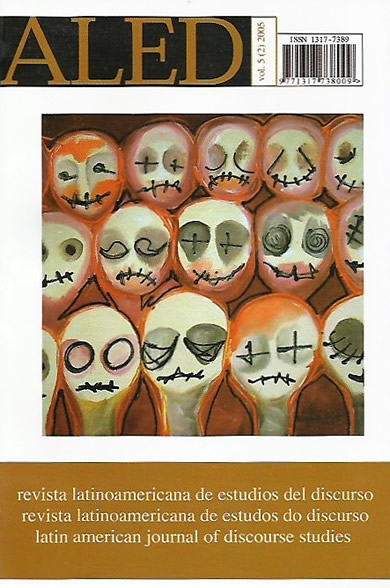Argumentación y funciones estratégicas en el discurso político venezolano
el cierre de campaña del referéndum revocatorio presidencial
DOI:
https://doi.org/10.35956/v.5.n2.2005.p.49-75Keywords:
argumentation. politic discourse. strategic functions.Abstract
From the point of view of critical discourse analysis, the main objective of this study is to describe the argumentation and the strategic. functions of Venezuelan political discourse, from a linguistic perspective. The analysis of the different forms through which political actors try to persuade their adversees by mainly based on the postulates of the Nueva Retórica from Perelman and Olbrechts-Tyteca (1989), and the discourse strategies proposed by Chilton and Schäffner (2000). I analyzed two speeches of the end of the campaign for the presidential referendum which took place in August 2004. The first one by the government and the second one by the opposition. The study shows the argumentative techniques and the strategic functions used by the leaders of these sectors, and provides evidence of the narrow relationship between both categories.
Downloads
References
ATIENZA, M. (1993) ‘Las razones del derecho. Teorías de la argumentaciónjurídica’. Cuadernos y Debates31. Madrid: Centros de estúdios constitucionales.
ALBALADEJO, T. (2001) ‘Argumentación, refutación y construcción deconfluencia en la oratoria política de la Transición’, en J. A. Hernández Guerrero et al. (eds.), Política y oratoria: el lenguaje de los políticos, pp. 23-37. Cádiz: Universidad de Cádiz.
ALBALADEJO, T. (2002) ‘La lectura del discurso oral’, en J. A. Hernández Guerrero et al. (eds), La recepción de los discursos: el oyente, el lector y elespectador, pp.17-29. Cádiz: Universidad de Cádiz.AUSTIN, J. (1962) Cómo hacer cosas con palabras. Barcelona: Paidós.
BLAS ARROYO, J. L. (2001) “No diga chorradas...”. La descortesía en el debate político cara a cara. Oralia, 4, 9-46.
BOLÃVAR, A. (1995) ‘Una metodología para el análisis interaccional del texto escrito’. Boletín de lingüística, 9, 1-18.
BOLÃVAR, A. (1997) ‘El análisis crítico del discurso: teoría y compromisos’.Episteme NS. 17, 23-45.BOLÃVAR, A. (2003) (Editorial) ‘Discurso y democracia en Venezuela’. Discurso y Sociedad, vol 4(3), 3-10. Barcelona: Gedisa.
CALVO MARTÃNEZ, M.A. (2000) ‘Análisis retórico del debate político en las recientes elecciones presidenciales estadounidenses’, en Hernández Guerrero,J. (ed), Emilio Castelar y su época. Actas del I Seminario Emilio Castelar y suépoca. Ideología, retórica y poética, pp. 235-253. Cádiz: Universidad de Cádiz.
CHILTON, P. & SCHÄFFNER, C. (2000) ‘Discurso y política’, en T. van Dijk(comp), El discurso como interacción social. Estudios sobre el discurso, um aintroducción multidisciplinaria, vol. 2, 297-329. Barcelona: Gedisa.
CHUMACEIRO, I. (2004) ‘Las metáforas políticas en el discurso de dos líderes venezolanos’. Revista Latinoamericana de Estudios del Discurso, 4(2), 91-113.
ERLICH, F. (1993) La interacción polémica: estudio de las estrategias de oposición en francés. Caracas: CDCH. Universidad Central de Venezuela.
FAIRCLOUGH, N. & WODAK, R. (2000) ‘Análisis crítico del discurso’ en T.van Dijk (comp.), El discurso como interacción social. Estudios del discurso:una introducción multidisciplinaria, vol. 2, 367-404. Barcelona: Gedisa.
GALLUCCI, M. (2004) La Mesa de Negociación y Acuerdos: espacio de encuentros y des-encuentros en el discurso político venezolano. Caracas: Escuela de Letras-UCV (trabajo de grado para optar al título de Licenciado en Letras, inédito)
GALLUCCI, M. (2005) Discurso político y argumentación: teoría y praxis en la realidad venezolana. Madrid: Instituto de la Lengua Española- Consejo Superior de Investigaciones Científicas (tesina para optar al título de Magísteren Filología Hispánica, inédito)
GUERVOS, J. (2005) Principios de comunicación persuasiva. Madrid: Arco Libros.
HABERMAS, J. (1987) Teoría de la acción comunicativa. Madrid: Taurus.
LÓPEZ EIRE, A. (2000) ‘Retórica y política’, en J. Hernández Guerrero, J. (ed),Emilio Castelar y su época. Actas del I Seminario Emilio Castelar y su época. Ideología, retórica y poética, pp. 89-143. Cádiz: Universidad de Cádiz.
MOLERO, L. & GALBÁN, A. (2002) ‘Estrategias discursivas de oposición en el discurso político electoral venezolano’, en L. Molero y A. Franco (eds.), El discurso político en las ciencias humanas y sociales, pp. 108-123. Caracas:FONACIT.
PERELMAN, CH. & OLBRECHTS-TYTECA, O. (1989) Tratado de laargumentación. La nueva retórica. Madrid: Gredos.
TOULMIN, S. (1958) The uses of argument. Cambridge: Cambridge Univeristy Press.
VAN DIJK, T. (1980) La ciencia del texto. Barcelona: Paidós
Downloads
Published
How to Cite
Issue
Section
License

This work is licensed under a Creative Commons Attribution-NonCommercial-NoDerivatives 4.0 International License.
The authors retain the copyright and guarantee RALED the right to be the first publication of the work as well as a Creative Commons Attribution License that allows others to share the work with recognition of authorship and the initial publication in this journal.




